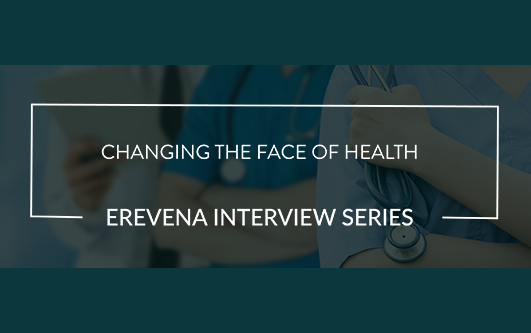Kai Eberhardt is cofounder and CEO at Oviva, the award-winning digital healthcare provider that’s utilising technology to transform the treatment of lifestyle-related health conditions, such as obesity and diabetes. Like many innovators in the healthcare space, Kai’s inspiration for Oviva stems from a deep and personal interest in the topic at hand. He talks to Jonathan Bryant, Partner at Erevena about Oviva and the future of healthcare.
Can you provide some of your and Oviva’s back story?
My personal motivation for healthcare and really began when I was in my twenties and had cancer when I was studying physics. This pushed me in a medical direction, and I pursued medical imaging. After a PhD in a related topic, I moved to the consulting firm McKinsey where I focused on topics such as access to new medical/healthcare products and reimbursement for healthcare provision.
Where did the idea for Oviva come from?
The Oviva story started in a conversation with a friend who was medical doctor working in paediatrics. He told me how he was dealing with overweight youngsters, providing them with dietary treatment. He had to refer his young patients for therapy with dietitians but was struggling to get them to stick with it. He had the seed of the idea. Could technology be the answer?
How did you take the idea forward?
Working with my cofounders and a small team, we designed a technical solution and built an app to connect patients and dieticians, significantly reducing the need for physical face-to-face meetings. Because patients would be able to access therapy sessions remotely via their smartphones, they would be more likely to stick with the programme. Making care truly accessible has been very important for us from day one. We started by targeting the dietitians themselves as customers for our technology, but quickly discovered we needed a different approach whereby our product was integrated into a bigger health solution. So, we changed direction – from both a customer and product perspective.
Can you talk us through this new direction?
We became care providers, rather than just selling a product. Many of the dietitians we previously targeted joined our team, so that we could offer a fully integrated service with access to healthcare professionals and programmes of nutrition and lifestyle advice. We then sold this integrated solution directly into commissioning bodies, such as the NHS in the UK. It’s important to point out that our solution can both prevent conditions and help patients to control them and stop their symptoms developing further. The main focus is on the latter. This is about health economics. The cost to the economy of type 2 diabetes and obesity-related health problems is huge – and growing fast. By providing patients with any-time, anywhere, on-any-device access to personalised dietary and lifestyle support, we can reduce severe follow-on effects and demand on secondary care and hospitals.
How did you fund your journey?
Like many start-ups, we depended on family and some first angel investors who believed in the team initially. But because we were able to show a scalable model for our solution pretty early on, we quickly attracted some first-rate venture capital investors such as Albion VC, Eight Roads Ventures, F-Prime Capital and Partech. We also had a strong team, which was important for potential investors. We’ve recently raised another round of venture capital from MTIP and Earlybird, so our task now is to ensure we make best use of that opportunity.
How has your team changed and what attracts new talent?
Digital health needs people at different professional levels and from different disciplines. So, we’ve brought on board the right people to build Oviva going forwards. Around 50% of our workforce is now made up of dietitians/professional health practitioners. Building a team can be costly for a start-up, which is why raising venture capital has been so important. At the most basic level, a digital health solution provider needs people with expertise in technology, medical systems and the healthcare itself. That’s before you add in the sales, marketing and other essential staff. We’re a mission-driven company and that makes it easier for us to attract the talent we need to continue our growth. Everyone has been touched by healthcare at some time in their lives and the technology people who join us want to be part of our mission to make healthcare accessible. Our healthcare professionals have often been frustrated with the administrative burden associated with the technology solutions they’ve had to work with in public sector health. They’re attracted by Oviva’s vision to help many more patients effectively with the help of technology.
What next for Oviva?
We’re constantly evolving. Our technology is getting better – and we’re getting better at using it. As an example, four years ago, it would take around four hours to carry out the initial patient survey/contact and onboard them for therapy. They’d typically stay with the programme for up to five months. Now it takes us just two hours to bring a patient on board and we’re seeing better outcomes and patient satisfaction levels for the same five-month therapy duration. Data capture is also becoming more efficient, enabling us to build more evidence-based care, which will help to shape our solution still further. We already use machine learning for food recognition and to help to prioritise patient need. As we capture and analyse increasing volumes of patient data, I predict more exciting digital health propositions to become available.
What impact has the global Covid-19 coronavirus crisis had on Oviva?
We depend on new referrals from GPs but, of course, patients are largely staying away from their local medical practices in the current crisis. That means we’re not bringing on board new patients, although as a remote service provider, we’re still treating our existing patients. The lack of referrals (both to us and to traditional physical dietary programmes) will ultimately cause a backlog for GPs and commissioning bodies. Looking ahead several months, I believe that once we learn to manage the immediate crisis, the value of solutions like ours will be greatly appreciated. So much so that, as digital healthcare is increasingly viewed as perfectly acceptable, we’ll see the rate of adoption escalate.
So, is digital health the way forward?
The statistics give you the answer to that. In traditional physical face-to-face therapy, only around 20% of patients complete the care programme offered. With our combination of digital health technology and contact with empathetic, qualified professionals when they need to, we expect 70% of patients to complete the programme offered. Demand for digital health technology solutions is growing. In the UK alone there are currently 7 million people with prediabetes. The financial burden on health providers is huge, so digital tools that ease this burden are highly prized. Oviva can already treat 100,000 patients and we expect to see a big rise in this number over the coming years. We’re also working in Switzerland, Germany and France, with more opportunities to expand into new regions as demand grows.
Share this article:












